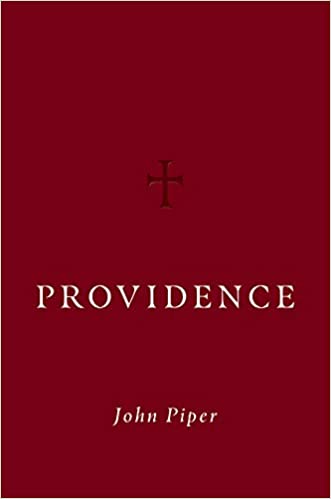A Book Review from Books At a Glance
By Steve West
The first endorsement on the inside cover of Providence is provided by D. A. Carson. He begins his endorsement by saying: “In what is perhaps his most important book so far….” Consider for a moment some of the titles that Piper has penned over the years. Although different titles will immediately occur to different people, a small selection of influential books by Piper include: Desiring God: Meditations of a Christian Hedonist. The Supremacy of God in Preaching. Let the Nations be Glad! The Supremacy of God in Missions. Don’t Waste Your Life. A Peculiar Glory. The Justification of God: An Exegetical and Theological Study of Romans 9:1-23. There are of course many, many more, ranging across a spectrum from popular-level to academic. Piper has been an extraordinarily prolific author, and many of his books have sold well and been read widely.
Some of his other titles have had a smaller reading audience, but that audience has consisted of pastors, missionaries, and teachers who pass along to others the insights that they’ve gleaned. How do we gauge how “important” a particular book is? Carson gave a proper qualification that this is “perhaps” Piper’s most important book so far. In the end, I’m sure that both Carson and Piper would agree that it is God’s providence that will determine which of their books is truly most important. But from a human vantage point, right now Providence seems like a very good candidate for that distinction when it comes to books Piper has authored.
There are a variety of reasons why this may be Piper’s most important book. First, Providence is a magnum opus after a lifetime’s worth of thinking, preaching, teaching, and writing. Piper’s writing and thinking show no signs of decline. In fact—as much as this is subjective—I think Providence is some of Piper’s best writing when considered purely at the level of communication. The writing bears all of the recognizable marks of Piper (it is “Piperesque”), but it seems like some of the rhetorical flourishes and the piling on of hyphenated descriptors has been restrained. This may not be true: perhaps a statistical analysis of his writing would reveal something different, but the impression in reading this book, indexed against my memory of reading a number of Piper’s books, is that his writing seems like it is more mature and effective now than ever before. Considering his publication record, that is high praise indeed! It is not that he was a poor writer and that this is good writing, but rather that he’s been an incredibly fecund and effective author for decades and this is some of his best prose.
Second, Providence is thoroughly and comprehensively biblical. There are an incredible number of biblical texts—some of which are quite long passages—which are printed in full in the text. The reader does not need to look up passages since they are reproduced in the book itself. Reading nothing but the biblical texts builds up a cumulative argument for the overarching sovereign providence of God. With Piper’s clear writing providing explanation and insight, readers can see how he is deriving his theological conclusions from the texts themselves.
Third, Piper demonstrates philosophical awareness but does not clutter up the book with terms of philosophical jargon that makes the argument inaccessible to non-specialists. One will look in vain for an explicit discussion on compatibilism and incompatibilism, determinism and libertarianism, etc. Yet Piper clearly has a well-thought out compatibilistic position; he couldn’t make some of the careful statements he makes without that deeper awareness. Yet his approach—regardless of whether you agree with his conclusions on these issues—should find wide agreement amongst evangelicals. He argues that we should not come to the text with philosophical presuppositions that dictate what needs to be the case in order for us to be responsible. Rather than doing that, Piper argues that we should see what the text actually says and then formulate our criteria for responsibility on the basis of what God has revealed is actually the case. This method is sound. Piper’s conclusion is that God has revealed that we are morally responsible for what we do even though we do not have the power of ultimate self-determination.
Fourth, this book is biblical, theological, and pastoral. It is filled with worship, encouragement, and hope. Piper does not duck the toughest issues that his strong view of sovereignty and providence entail, but he treats them with sensitivity. He writes as a very strong and convinced Calvinist, but also as a man with a heart of evident compassion. He loves God and loves people. He loves God’s Word and wants to know it, understand it, and teach it. Hopefully, those who agree completely with his content can also adopt his tone.
Fifth, this book can be profitably read by professors, pastors, missionaries, students, and basically anyone else who reads serious Christian literature. It can be used for small groups and Sunday School classes. It can be used in discipleship settings. It can be used both for in-depth Bible Study and for devotional reading. Providence can serve as the first book someone reads on the subject of providence, or as one of the last that someone reads after a lifetime of study. In virtually any situation, the book is worth reading.
Given the focus of Piper’s lifetime of ministry, Providence represents his teaching very, very well. It may not be his last book, but it may indeed be his most important. Only time will tell how God uses this book in his providence, but it seems likely that it will be used in a way that is deep and wide.
Steve West is pastor of Madoc Baptist Church in Madoc, Ontario, and an adjunct professor at Heritage College and Seminary and Toronto Baptist Seminary. He is also an assistant editor here at Books At a Glance.
